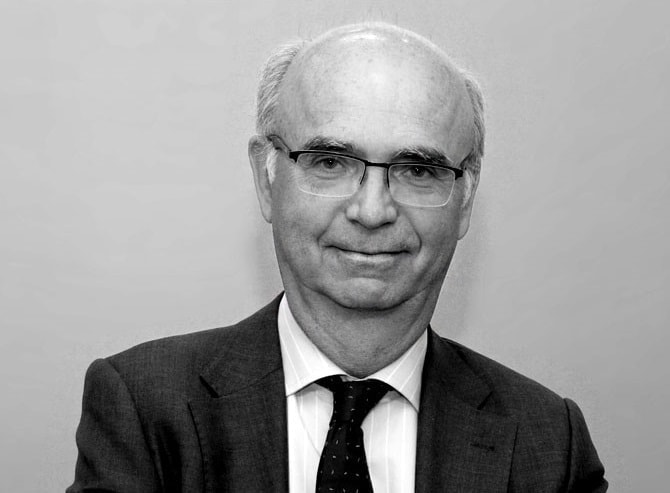
Alberto López-Oleaga: "All activity leaves a digital footprint and if this is well managed it can transform our businesses."
26 of May of 2016
Digital transformation, centres of competence, innovation… everybody’s talking about these things. They feature on front pages, articles and events such as the Digital Enterprise Show, which was held in Madrid from 24 to 26 May. We interviewed Alberto López-Oleaga, Director for Innovation and Processing in Ferrovial, and asked him what innovation is, what role it plays in Ferrovial, and how the company is tackling digital transformation.
An Interview with Alberto López-Oleaga
- “Innovation” is a much talked-of concept lately, and possibly one which has been given other meanings, confusing it with terms such as research and development (R&D), entrepreneurship, technology or digital transformation… How can we define innovation in a tweet? Is everything related?
Innovation means ideas plus marketing. In other words, ideas which are implemented, thus generating value. Without implementation and/or marketing, you cannot talk of innovation.
- Is innovation something you learn, or is it part of human nature?
Innovation is something you can learn. Obviously, due to specific training or skills, some people are more enterprising than others, more open to new ways of doing things… but ultimately, innovation is a process which requires techniques and methodologies, and these are learned and developed to help the creative and innovation process.
- What role does innovation play in Ferrovial? What is a normal day like for a member of the innovation team?
The role of innovation in Ferrovial is driving global initiatives: encouraging, promoting and supporting the development of innovative solutions. Ferrovial’s Innovation Department is a multidisciplinary department, geared towards giving support to our four divisions: Services, Construction, Airports and Roads. In a systematic manner and depending on the needs and priorities of our business, we identify challenges and try to find solutions by developing projects, looking for the best partners, while keeping within the mentioned model of open innovation. We also have indicators which allow us to monitor and evaluate our innovation projects.
- Ferrovial often innovates away from its offices. Why is it so important to work with startups, with other large companies, with universities; to have agreements with the MIT? What do we gain with it?
Ferrovial works with an open innovation model, which means working with the best partners and collaborators, those best suited to the projects we want to carry out. In this respect, we have agreements with technological centres, such as the Massachusetts Institute of Technology, and with over 30 universities. We also work on European projects with companies from different sectors, startups, clients and public bodies. Ultimately, we are open to any partners, including the competition, provided they add value and can work to complement what we do, pursuant to project requirements.
- Are technology and everything digital directly related to Innovation? Is this where digital transformation comes in?
[inlinetweet prefix=”” tweeter=”” suffix=””]Digital transformation seeks to develop innovative projects based on new technologies[/inlinetweet] to allow us to identify new ways of generating profits and improving our operations. I would say that within our activities, we manage assets and infrastructures through a highly mobile work force and a fleet of thousands of vehicles, impacting millions of users and clients. Today, all of these activities and the links between them leave a “digital footprint” which, if properly managed and analysed, will allow us to transform and complement our businesses.
- There is a great deal of debate going on around digital transformation and its application. Whilst some talk about it as a new trend and apply it as an independent process, others argue that it is important for digital transformation to be present in every area and process of the company. How is Ferrovial implementing this transformation?
Ferrovial has been developing projects with digital technologies for some time now. Recently, after debating the issue, the decision was taken to create a Digital Hub in order to speed up the process of transformation and learning. This is a multidisciplinary centre, organised by projects, with a horizontal and collaborative organisational structure, supported by flexible development methodologies.
- What does digital transformation mean for a services and infrastructure company? Does it add value for our clients and our projects?
That’s the idea. If there is no added value for clients and projects, there is no innovation. As we said before, a company like Ferrovial is ultimately managing data and information (regarding operations, marketing, etc.). In as much as management of such data allows us to improve operations, better predict certain situations and offer new services, then we are generating value, which is our ultimate goal.
- Why are events such as the Digital Enterprise Show so important for innovation and transformation? What are those attending on behalf of Ferrovial looking for?
Events like these are important because they are a forum for showcasing solutions, for bringing different actors together (companies, entrepreneurs, public bodies, etc.), and also for raising awareness on the importance of new technologies for society as a whole.
- In meetings of this kind, prototypes or pilot projects are often presented. How much of this is fact, how much is fiction? Will there come a time when we won’t be asking this question?
In the case of Ferrovial, we are going to show some videos of real prototypes we have developed. The problem isn’t whether these prototypes are “fictional”, but rather how to go from a prototype to having an industrial product: and this takes us back to the implementation we were talking about in the beginning, without which there is no innovation.






There are no comments yet